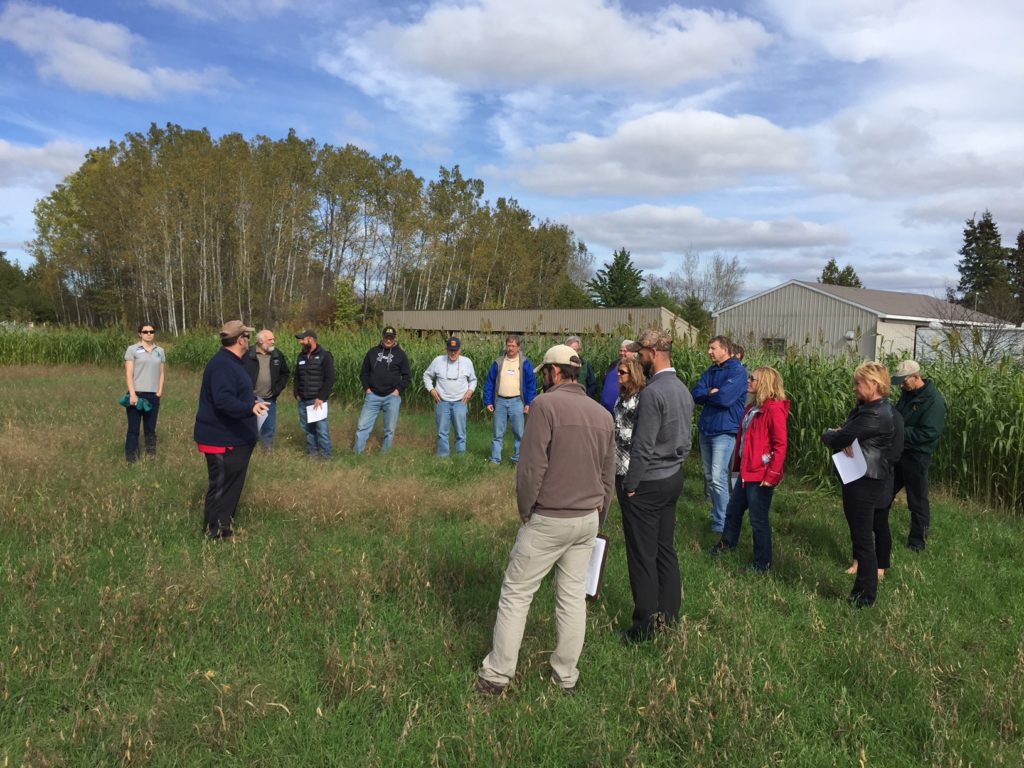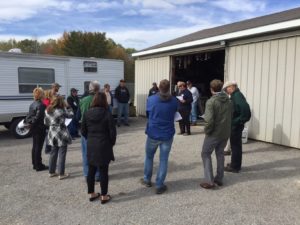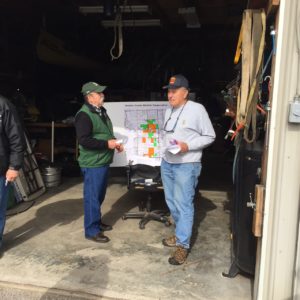
NRC Commissioners visit Wildlife Cooperative in TB Zone
by AnnaMitterling, Wildlife Cooperative Coordinator, MUCC
Wednesday, before the NRC meeting last week, Anchor Creek Wildlife Cooperative hosted some of the NRC Commissioners and Michigan Department of Natural Resources Staff at one of their properties to provide insights on how the cooperative model is helping to address Bovine Tuberculosis (TB) related concerns in the TB area.
The cooperative was established in March 2016 and started with 624 acres, and just over a year later, they have a total acreage of 922 acres. The cooperative includes neighboring agricultural producers along with proactive deer hunters and landowners.
 This Spring, the cooperative collaborated with the Michigan WIldlife Cooperatives Program (LINK), along with the local DNR staff and Conservation Districts to conduct a browse survey on the cooperative’s properties. Members were trained by staff on how to conduct the survey, and the results were analyzed by the cooperative coordinator and reviewed by local DNR staff. The results indicated high habitat impacts from deer and motivated the cooperative to do some camera surveillance to estimate sex ratios and help estimate a target antlerless harvest. Based on the information gained from these studies, the cooperative is going to increase antlerless harvest by 20 deer and work with the local agricultural producers if additional harvest is needed.These numbers will be evaluated annually, and compared with observation data during the hunting seasons.
This Spring, the cooperative collaborated with the Michigan WIldlife Cooperatives Program (LINK), along with the local DNR staff and Conservation Districts to conduct a browse survey on the cooperative’s properties. Members were trained by staff on how to conduct the survey, and the results were analyzed by the cooperative coordinator and reviewed by local DNR staff. The results indicated high habitat impacts from deer and motivated the cooperative to do some camera surveillance to estimate sex ratios and help estimate a target antlerless harvest. Based on the information gained from these studies, the cooperative is going to increase antlerless harvest by 20 deer and work with the local agricultural producers if additional harvest is needed.These numbers will be evaluated annually, and compared with observation data during the hunting seasons.
In addition to their habitat and herd evaluations, Anchor Creek Wildlife Cooperative is working with MSU Extension Agent James DeDecker on evaluating the values of “decoy” food plots to reduce impacts by deer on agricultural fields. DeDecker has found that using these “decoy” plots strategically has shown a reduction in crop damage. Strategically placing these food plots in travel corridors near agricultural fields is a technique the cooperative is utilizing. To help finance these projects, Anchor Creek Cooperative has applied for the DNR PLAN grant and has been a successful recipient for the 2017 and 2018 grant cycles.
The DNR PLAN (Private Landowner Assitance Network) grant program is designed to produce tangible deer habitat improvements, foster productive relationships between the DNR, sportsmen’s organizations and private landowners, increase deer availability to public and private land hunters, reduce transmission of Bovine Tuberculosis and agricultural damage caused by deer and encourage the harvest of deer, especially antlerless deer and testing of deer for TB. This grant program is targeted for implementation in the Northern Lower Peninsula.
 The main focuses of Anchor Creek Cooperative are:
The main focuses of Anchor Creek Cooperative are:
- Reduce conflicts between deer and agricultural producers by building relationships between local hunters and producers, reducing deer densities, and providing alternative food sources for deer.
- Understand deer impacts and densities and manage habitat and herd according to data
- Fund habitat work using PLAN grants
- Eliminate the stigma of “the only good deer is a dead one” and replace it with the idea that “the only good deer is a managed one,” understanding that deer populations in balance with their habitat reduce impacts on the agricultural community.
The cooperative is taking great strides to start reaching these goals. They wouldn’t be able to do what they have accomplished so far without the support of what their leader, Perry Wood, calls his “Support Team,” which is comprised of local DNR Staff, local Conservation Districts, MSU Extension and the MUCC Wildlife Cooperative Coordinator. Joining the Support Team will be a new position established by the DNR Wildlife Division, a Wildlife Health Specialist. This position functions as the program lead and recognized resource person to proactively address wildlife disease issues in the Northern Lower Peninsula. Their operational responsibilities will be to develop and coordinate the outreach, field activities and interactions with private landowners, hunting clubs, sportsmen’s groups, agricultural interests and other state and federal agencies.
Special thanks to Shelby Hiestand, Emily Sewell, James DeDecker, Brian Mastenbrook, Ashley Autenrieth and Anna Mitterling for supporting the development of Anchor Creek Wildlife Cooperative and for equipping them for success. Thank you to the NRC commissioners who came out and took an interest in the cooperative model which allowed this group to showcase its accomplishments. Great job Perry Wood for leading a such a great group of people who are looking for solutions!

Well done Perry and company!